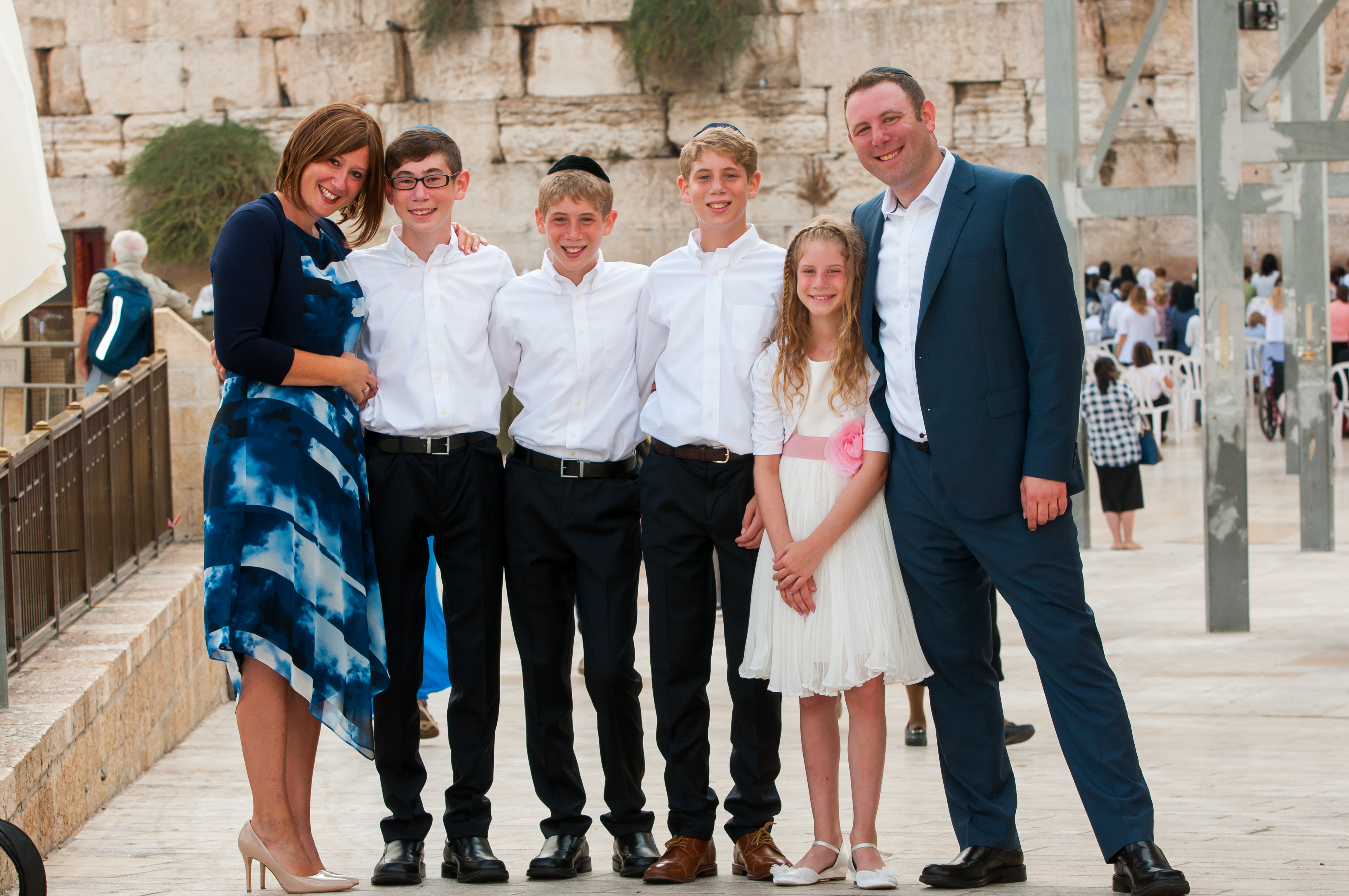Shim Craimer, whose dulcet tones and high energy have secured him a place as a sought-after Jewish musical performer, has sung at hundreds of weddings in the New York area and in his native London over the past two decades. But that’s just one of his jobs.
The 40-year-old has utilized his trained tenor voice to work with many fellow Jewish performers; and composed and produced multiple studio recordings, including an “Israel at 60” collaboration with his close friend Rabbi Lord Jonathan Sacks that garnered 3 million hits on YouTube. He’s also featured in several music videos.
He has also worked as music director at SAR Academy, and a music and media instructor at Torah Academy of Bergen County in New Jersey.
In fact, he’s all these things and more. And soon, he is moving to Israel.
His newest song, “Tziyon,” which was originally produced as a closing credits’ song for an Israeli movie that has yet to be released, will be set to a music video of his family’s aliyah, produced in partnership with Nefesh B’Nefesh. His family’s move to Israel this summer will be on a charter flight with 232 other North American new immigrants. (The flight is organized by Nefesh B’Nefesh in cooperation with Israel’s Ministry of Aliyah and Integration, the Jewish Agency for Israel, Keren Keyemeth Le’Israel and JNF-USA.)

Family and career grows
The Craimer family moved to Riverdale, in the Bronx borough of New York City, in 2003. Trained at a music school in London and a member of the Ner Yisroel Community synagogue in Hendon, he served as chazzanat the Edgware United Synagogue—one of the biggest congregations in the United Kingdom—before relocating to the Riverdale Jewish Center after one of its members heard him sing at a friend’s wedding in the United States, and brought him to Riverdale for a Shabbat where he was offered the job that night. He and his wife, Ruthie, had just one child, Uri, at the time. After 15 years, their family now includes twins Ben and Eli, and daughter Mia.
Being part of a community that welcomed the young British couple who were “coming for a year, maximum,” while they waited to see if Craimer’s musical career would take off, he says the years were good to them. The synagogue relationship, in particular, has been amazing, he adds.
“It never felt like a job to work at the Riverdale Jewish Center. Fifteen years later, we are still here,” he says.
Ruthie became a beloved early-childhood teacher at SAR Academy, and her husband’s career as a musician employed day and night reached heights they never imagined, resulting in Craimer’s freelance collaboration with many of New York’s busiest Jewish bands, including Neshoma Orchestra, Kol Play, the Ike Walkover band and Aaron Teitelbaum Orchestra, as well as many fellow cantors and commercially successful Jewish singers. In the past few years, he saw success in his own compositions and musical productions, even incorporating his twin sons to sing on his albums.
This twins sang on his just-released video, “Tzaddik Katamar,” from his latest album “Forever More/Me’atah V’ad Olam.” He released a video to the title track “Forever More” last year. Every song on the album is his own composition.
In fact, the opportunities in New York were so varied and so good, he notes, that it became increasingly difficult to consider going home to London, even as virtually all of Ruthie’s family has made aliyah in the years since. “In the time that we’ve been in Riverdale, we have always had in the back of our minds … Israel. If we had gone in 2003 to Israel, the kesher [community] that I have with the Jewish world would have been very different.”

Planning for the move to Israel
The Craimers decided to make aliyah when they were visiting Israel last year, deciding they had many family members and friends in Israel that they didn’t want to have anywhere else as a base. Their wish to be closer to family was a key factor in their decision. Craimer’s song “Tziyon” was composed on that trip, and he remembered the moments he wrote it and the thoughts it crystallized. “It’s about how amazing Israel is in my eyes. Nefesh B’Nefesh is sharing it as a video diary of our aliyah,” he says.
They plan to move to Modi’in, in central Israel, where Ruthie aims to open an early-childhood center, or gan. But Craimer’s roots have grown so strong in New York that they’re not pulling up entirely. “I’ve worked out with the Riverdale Jewish Center to come back once a month to daven for Shabbat, and for Rosh Hashanah and Yom Kippur, and for one Yom Tov a year,” with the flexibility to schedule his smachot and musical gigs in the United States around the weekend he comes to New York. He also plans to stay for an extra Shabbat a few times a year to allow for guest chazzan appearances in other synagogues around the country.
Another benefit of living in Israel is that Craimer will have access to other types of opportunities, in terms of vocal performance and teaching. He is already booked at cantorial concerts, which is a market he didn’t delve into much in the States, and at weddings he is already sought after for what he calls the “chutznik” market. (Chutzniks are English-speaking Israelis or those visiting Israel to make a wedding or bar mitzvah who seek an American-style event.) A band he has worked with often, Kol Play, is now setting up an Israeli office, and will be booking gigs for him in the United States, London and Israel.
Conducting a new children’s chorus
Perhaps the most exciting new aspect of Craimer’s developing career is in conducting and mentoring. He is involved in the early stages of the creation of a new vocal-based program called Shir Ha’Am, a nonprofit chorus following the idea of the Young People’s Chorus, based near Lincoln Center, which was established by Conductor Francisco Núñez for disadvantaged children. Craimer said he was approached by a Chicago-based philanthropist who wants to set up a similar program in Israel.
Craimer was taken with the idea, and is impressed by how well the Young People’s Chorus has done. “It started with seven at-risk kids in the basement of a church. Now it has 450 kids who come there two to three times a week,” he says. “It’s now the hardest choir to be a part of in the United States.”
The concept of the Israeli chorus will be to welcome children ages 10 to 19 who are into music, and who can potentially benefit from instruction, companionship or mentorship opportunities. The plan, he says, is to create three different performance groups: “one for boys, one for girls, and one mixed boys and girls, so we are open to everyone. They will perform at hospitals and rehab centers, and hopefully become self-sustaining and [get] some government funding.”
Is this Craimer’s biggest aspiration, to create such a choir to improve the lives of at-risk youth in Israel? “I am at a different stage now, developing goals. I am still very busy with davening, performing and smachot, but you have to keep evolving. There is a lot more competition in terms of being able to put out as much as you can in terms of your compositions; you need to be more versatile.”
“When I reach my 70s, I want to, of course, have had a successful musical career, but also I want to have this opportunity to start something, to begin something like this,” says the musical multi-tasker. “The idea has been born, so it would be amazing to see it happen.”


























